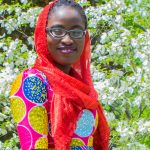By Terri-Lynn Langdon, Lead Editor and Writer
Questions around how the University of Toronto can support international students using an intersectional lens in the best ways possible are critical. We need to support students who have not been traditionally supported in their educational and skill development. In this role as a Lead Editor and Writer, I take great care to capture stories that need telling. I had the privilege to sit down and talk to Ngoné about what is going on in her life as a U of T student.

Ngoné Lo is a 27-year-old 2nd year International student from Senegal with a mild to moderate hearing loss. She is enrolled in a Master of Information, Human Centered Data Science at U of T. She received a full-scholarship to her program through the MasterCard Foundation program for young African leaders. Ngoné has also been been a part of our Students with Disabilities project this Summer in our iSchool practicum.
In our virtual meeting I notice that Ngoné is wearing a shirt that says ‘Be you Do you for You’ and I start to wonder what her student experience has been like at U of T and what her thoughts are for the academic year this September.
Ngoné says that she misses the opportunity to collaborate and coordinate with others in person through she stresses that she is glad that she had developed a support system and an understanding of Canadian culture and experiences prior to the lockdown. She shares, that her concern is unequivocally for new International students coming to University of Toronto this fall. She says that, ‘If you are new to Canada, being an international student with a disability is not the best combination, there are a lot of disadvantages and things to navigate and incoming students will not get the cultural exposure to living in another country because of the current pandemic’.
She shared that International Students coming to University of Toronto this fall will likely struggle with loneliness and isolation on top of the stress of courses and starting a new degree program.
For Ngoné, she is confident that her term will go well because she knows about the processes and supports at U of T but she also notes that online classes have not been ideal. As student with hearing loss, she has notetakers as an accommodation. When Ngoné was attending classes, that note-taker was helpful to connect with in real-time when she was not able to hear all of the contents of a lecture of a student discussion.
Although online classes are recorded and students have the benefit of listening to the recording after class, Ngoné pointed out that this is not time-efficient, nor practical if she cannot hear parts of a virtual lecture or discussion. As she says, ‘I want to know what is going on in class when it is actually happening’!
When I asked Ngoné what is getting her through the pandemic, her studies and life she shared that she said, In the current situation, ‘I remember why I was given the opportunity to pursue my education at UofT and my friends’. She added that she believes reaching out for help and giving help is important and she ties this to her current role at U of T Innovation Hub and her way of being in the world.
0 comments on “In Conversation with Ngoné Lo: Insights into the Experiences of International Students with Disabilities and Musings on the Fall Semester”